If you asked me whether I worked from home or in an office during my full-time career, I’d probably say I spent more time in an office. But when I started designing the cover image for this blog post, I realized the truth. It turns out, I’ve only worked in an office for 1 year and 9 months, while I’ve actually worked from home for 3 years and 7 months. That’s nearly half the time!
Perceptions of time while working remotely
Two main factors contributed to my skewed perception of time when considering the duration of my work experiences in different settings. The first factor is quite evident: the impact of Covid. It’s difficult for anyone to accurately gauge the passage of time during the pandemic. Recall of events from that period often requires significant effort, as many struggle to pinpoint specific occurrences. Questions like “Did we purchase that couch in 2020 or 2021?” highlight this challenge. The second factor relates to the relativity of time, which is closely tied to the first. Engaging in a variety of activities can create the illusion of spending more time, even if the actual duration remains consistent. Our brains tend to prioritize storing memories of unique experiences and emotions, rather than repetitive tasks. This phenomenon leads to the perception that time spent engaging in diverse activities, such as those typical of office life, is longer compared to more monotonous remote workdays.
I felt like I spent more time at the office than at home for a couple of simple reasons. At work, there was always something going on: birthdays, parties (Farewell, Kick-off, Summer, Christmas), new team members, lunch outings, and post-work activities like bouldering, flat viewing, bike shopping or dinner with colleagues. We also had cultural events (Diwali, Adventkalendar, the Super Bowl), team gatherings, and outings. But when working remotely, these experiences were rare. Most days were filled with work, with breaks for tasks like going to the gym or grocery shopping. This routine made the days blend together, and time seemed to pass quickly without much notice.
While some may prefer to keep work and personal life separate, I understand them. However, I also feel sorry for them. For me, the people I work with are essential to my job satisfaction. If I didn’t enjoy their company, work would be something I dreaded every day. Many of my closest friends are former colleagues. We spent a lot of time together at work, creating many good memories, and we’ve stayed in touch, continuing to meet up even outside of work.
Advantages of remote work
Regarding the advantages of remote work, I understand there are numerous benefits:
- Elimination of commuting
- Opportunity to eat healthy and save money on lunch
- Ability to tackle household chores
- Increased time with family
- Enhanced focus on work
While I acknowledge these advantages, they also presented challenges for me. Although I avoided commuting, I found myself less physically active overall. While some colleagues hit the gym after work, I struggled to find the motivation. While I ate healthy, spending considerable time cooking each day dampened my enjoyment of the activity. Being single made me feel even more isolated because I lacked regular opportunities for in-person interaction. However, I excelled professionally due to the increased focus on my work.
It’s possible that these challenges may not affect others in the same way. For instance, someone with a family might find cooking more rewarding as they cook for multiple people, or someone with a gym routine might maintain their activity level. While remote work boosted my career, it didn’t necessarily improve my overall quality of life. This realization led me to leave my last job, despite enjoying it, as I preferred working in a non-remote setting, especially since my colleagues were based in Berlin.
Return to office
Recalling my time at XING and the enjoyable moments spent with colleagues, I realize how much I miss those days. It’s not just me feeling this way; conversations with former coworkers echo similar sentiments, despite our diverse life circumstances (married, married with kids).
Currently, I’m working at a company with an office in Hamburg, and I choose to go there every day, even though remote work is an option. This decision has significantly improved my mental well-being, mainly because of the increased social interactions with coworkers. Additionally, incorporating walking into my daily commute has made me more active, evident in the recent increase in my step count and stair climbs (my teamspace is at the first floor while the coffee machine at the ground floor 😅), as observed in my health logs:

Although my commute takes approximately 40 minutes (which will reduce to 25 when I switch to biking during the warmer seasons), I make the most of this time by walking around 2 kilometers and reading about 10 pages in the train. While I do spend more money on lunch, the central office location allows for the chance to explore new restaurants and dishes. Most importantly, I’ve been able to forge stronger connections with my coworkers, something that was challenging while working remotely.
Despite differing opinions on remote work, my professional journey has predominantly been remote. However, I’ve come to realize that it’s not my preferred mode of work. While I value the flexibility of occasional remote work, having a central office with amazing colleagues holds greater importance for me.



